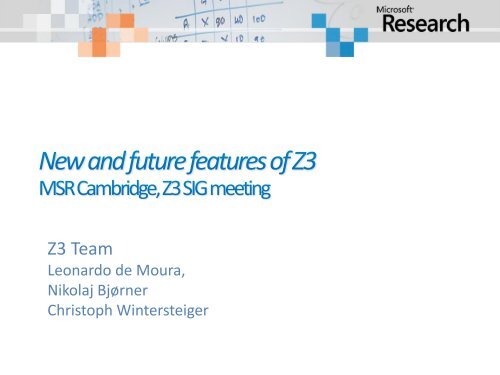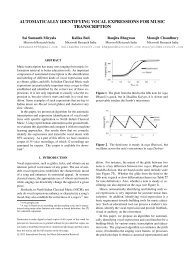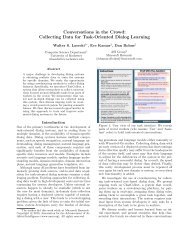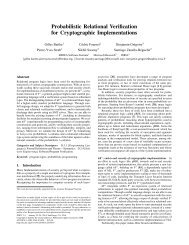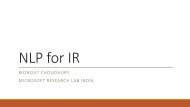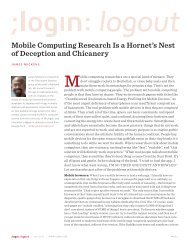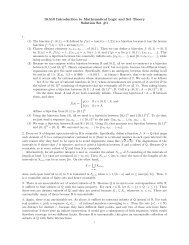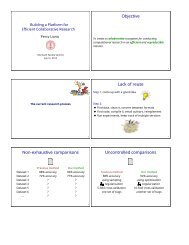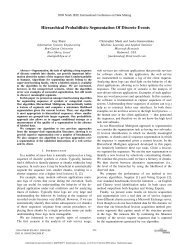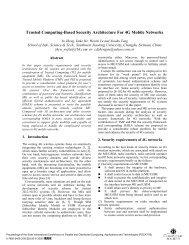proof - Microsoft Research
proof - Microsoft Research
proof - Microsoft Research
Create successful ePaper yourself
Turn your PDF publications into a flip-book with our unique Google optimized e-Paper software.
Z3 Team<br />
Leonardo de Moura,<br />
Nikolaj Bjørner<br />
Christoph Wintersteiger
Z3 is a theorem prover developed at MSR<br />
First version released in 2007<br />
First Clients:<br />
SPEC#/Boogie, SAGE, PEX<br />
Main Features in 2007<br />
Lazy architecture: SAT solver + theories<br />
Linear (real) arithmetic, BV, UF, arrays<br />
E-Matching (for Quantifiers)<br />
Push/Pop (incremental solving)
Popularized by SMT solvers such as: Simplify.<br />
Part of SMT-LIB 2.0 standard.<br />
push, assert(F1), push, assert(F2), check, pop, assert(F3), check<br />
Is<br />
F1 and F2<br />
Sat?<br />
Is<br />
F1 and F3<br />
Sat?
Windows 32 and 64 bit versions<br />
.NET wrapper (C#, F#, VB)<br />
Linux 32 and 64 bit versions<br />
New: Mac OSX (starting at Z3 3.3)
VCC<br />
NModel<br />
SAGE<br />
Hyper-V<br />
SpecExplorer<br />
Boogie<br />
HAVOC<br />
SLAyer<br />
Terminator T-2<br />
Vigilante<br />
F7
15k downloads (Windows version)<br />
New Domains New Requirements
Congruence<br />
Closure<br />
Simplification<br />
…<br />
0-1 solver<br />
DPLL<br />
SMT<br />
Superposition<br />
Simplex<br />
Grobner<br />
Basis<br />
elimination
Different Strategies for Different Domains.
Different Strategies for Different Domains.<br />
From timeout to 0.05 secs…
Hardware Fixpoint Checks.<br />
Given: and<br />
Ranking function synthesis.<br />
Join work with C. Wintersteiger and Y. Hamadi<br />
FMCAD 2010<br />
QBVF = Quantifiers + Bit-vectors + uninterpreted functions
Z3 is using different engines:<br />
rewriting, simplification, model checking, SAT, …<br />
Z3 is using a customized strategy.<br />
We could do it because<br />
we have access to the source code.
SMT solvers are collections of engines.<br />
They should provide access to these engines.<br />
Users should be able to define their own strategies.
goal<br />
Tactic<br />
subgoals<br />
Proof<br />
converter
goal<br />
Proofs for subgoals<br />
Tactic<br />
Proof<br />
converter<br />
subgoals<br />
Proof<br />
converter<br />
Proof for goal
goal<br />
Tactic<br />
Proof<br />
conv<br />
Tactic<br />
Tactic<br />
Proof<br />
conv<br />
Proof<br />
conv
<strong>proof</strong><br />
Proof<br />
conv<br />
Proof<br />
conv<br />
Proof<br />
conv
<strong>proof</strong><br />
Proof<br />
conv<br />
thm in LCF<br />
terminology<br />
Proof<br />
conv<br />
Proof<br />
conv<br />
<strong>proof</strong> in LCF<br />
terminology
then( Tactic , Tactic ) = Tactic<br />
orelse( Tactic , Tactic ) = Tactic<br />
repeat( Tactic ) = Tactic
goal<br />
Tactic<br />
subgoals<br />
Proof<br />
converter<br />
Model<br />
converter
Proof<br />
converter<br />
Tactic:<br />
elim-vars<br />
Model<br />
converter
Proof<br />
converter<br />
Tactic:<br />
elim-vars<br />
M, M(a) = M(b) + 1<br />
Model<br />
converter<br />
M
Proof<br />
converter<br />
Tactic:<br />
split-clause<br />
Model<br />
converter
simplify<br />
nnf<br />
cnf<br />
tseitin<br />
lift-if<br />
bitblast<br />
gb<br />
vts<br />
propagate-bounds<br />
propagate-values<br />
split-ineqs<br />
split-eqs<br />
rewrite<br />
p-cad<br />
sat<br />
solve-eqs
Probing structural features of formulas.
Under-approximation<br />
unsat answers cannot be trusted<br />
Over-approximation<br />
sat answers cannot be trusted
Under-approximation<br />
model finders<br />
Over-approximation<br />
<strong>proof</strong> finders
Under-approximation<br />
Example: QF_NIA model finders<br />
add bounds to unbounded variables (and blast)<br />
Over-approximation<br />
Example: Boolean abstraction
Models<br />
Proofs<br />
Unsat cores<br />
No support for incremental solving<br />
Workaround:<br />
use “all-purpose” incremental solver with timeout<br />
switch to “domain-specific” tactic if can’t solve in k ms
Current technology<br />
Linear Real: Simplex based<br />
Linear Integer: Gomory-Cuts, Branching, Model Finder, 0-1<br />
Nonlinear:<br />
Grobner Basis, Branching, Interval Propagation,<br />
Model Finder, VTS
New<br />
Linear Real: New Simplex based on state-of-the-art<br />
techniques from MIP<br />
Linear Integer: cutsat algorithm (complete)<br />
Nonlinear: cad-like (complete) algorithm, algebraic numbers<br />
x^5 + 2x + 2, [-0.8175, -0.8174]
New solver combining ideas from:<br />
Interval Propagation<br />
Reduction to arithmetic<br />
Bit-blasting<br />
Main target: verification problems<br />
No overflows<br />
No NaN<br />
Error estimation
No plans to support them in Z3<br />
News:<br />
Ken McMillan built a new interpolating prover on top of Z3<br />
Very good experimental results (FMCAD’11)
Memory management<br />
Old: scoped memory management<br />
Hack: Z3_persist_ast<br />
New: ref-count<br />
Z3_mk_context_rc, Z3_inc_ref, Z3_dec_ref<br />
Logging<br />
Old: Z3_open_log (.z3 file), Z3_trace_to_file (.c file)<br />
New: global Z3_open_log
Multiple Solvers & Tactics<br />
Many solvers per Context<br />
Incremental & Non-incremental Solvers<br />
Solvers based on user-provided Tactics<br />
We will continue to support the old API
http://rise4fun.com/z3/tutorial/guide<br />
New features:<br />
Models as “functional programs”<br />
Quantifiers and Modeling with Quantifiers<br />
Model Based Quantifier Instantiation
BV NEWS
News about Bit-Vectors<br />
Bit-blasted formulas are large<br />
Sometimes unnecessary<br />
What we’re looking into<br />
Stochastic Local Search<br />
Custom Propagators<br />
MICROSOFT RESEARCH CAMBRIDGE: OVERVIEW PRESENTATION 43
First Results<br />
Stochastic Local Search<br />
1000<br />
100<br />
10<br />
1<br />
0.1<br />
0.01<br />
0.01 0.1 1 10 100 1000<br />
Bit-blasting<br />
MICROSOFT RESEARCH CAMBRIDGE: OVERVIEW PRESENTATION 45
Quantification<br />
MBQI for (UF)BV<br />
Complete and efficient method<br />
Logic being added to SMT-LIB<br />
(set-logic UFBV)<br />
Finite-state problems<br />
Model Checking<br />
Synthesis<br />
MICROSOFT RESEARCH CAMBRIDGE: OVERVIEW PRESENTATION 46


